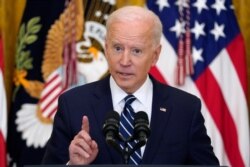The Afghan Taliban warned Friday that they would be “compelled” to continue their war against international forces in Afghanistan, should the United States and NATO decide against withdrawing their troops from the country by May 1.
The insurgent group’s warning came a day after U.S. President Joe Biden said that 2,500 American troops might still be in Afghanistan beyond the May deadline, which is part of a year-old agreement the former Trump administration signed with the Taliban in Doha, Qatar.
There are around 7,000 non-U.S. troops in the country under the NATO-led Resolute Support noncombat mission and 20,000 contractors who support Afghan government security forces battling the Taliban.
Biden cited "tactical reasons" for the possible delay but said that even if Washington did not meet the deadline, he could not envision the U.S. military staying in the South Asian nation past next year. On Friday, when asked about the U.S. withdrawal, White House press secretary Jen Psaki told reporters the president was still considering a timeline for a troop pullout.
The Taliban described Biden’s remarks as “vague,” in their formal written response issued Friday. The group insisted that the Doha pact “is the most sensible and shortest path” for the United States to end the two-decade-long Afghan war.
'Compelled' to keep fighting
The American side will be considered to have violated the accord if there is a delay to the agreed upon foreign troop withdrawal deadline, the group asserted. It added that the insurgents “will be compelled” to continue their “armed struggle” against foreign forces to “liberate” Afghanistan.
“All responsibility for the prolongation of war, death and destruction will be on the shoulders of those who committed this violation,” the insurgent group stressed.
The Taliban asserted that they are “firmly committed” to their end of the deal, advising Washington against “wasting this historic opportunity due to flawed advice and incitement by warmongering circles.” The group did not elaborate.
The insurgents ceased attacks on U.S. and allied forces after signing the deal with Washington, and there have been no U.S. military casualties since then in Afghanistan.
The Taliban are also bound to cut ties with al-Qaida and other terror groups, reduce battlefield attacks against local forces and negotiate a political power-sharing peace deal with Afghan rivals.
The U.S.-Taliban accord encouraged the insurgents to open talks with Afghan government representatives last September, but the intra-Afghan dialogue, hosted by Qatar, remains deadlocked.
Review of deal
The Biden administration initiated a review of the February 2020 U.S.-Taliban deal shortly after the president took office. The review has yet to be completed. Several high-ranking U.S. officials, meanwhile, have questioned whether the Taliban have kept their side of the bargain.
“It's clear that the Taliban have not upheld what they said they would do and reduce the violence," General Richard Clarke, commander of U.S. special forces, told U.S. lawmakers Thursday, hours before Biden held his first news conference.
"It is clear they took a deliberate approach and increased their violence since the peace accords were signed," said Clarke.
Earlier this month, U.S. Secretary of State Antony Blinken wrote a strongly worded letter to the Afghan president, Ashraf Ghani, urging him to “accelerate peace talks” and move “quickly toward a settlement.”
The letter said the United States had asked Turkey to host a high-level meeting between Afghan parties to the conflict to “finalize a peace agreement.”
The Biden administration has proposed establishing an interim government in Kabul along with a 90-day reduction in Afghan violence to sustain political reconciliation efforts.
Taliban officials have suggested they may agree to a 90-day violence reduction if Washington sticks to the troop withdrawal deadline, pressures Kabul to release the remaining 7,000 Taliban prisoners and ends the U.N. terror designations of senior Taliban leaders, as stipulated in the Doha agreement.
For his part, Ghani has voiced strong opposition to any interim Afghan government, saying he would transfer power only through elections.
VOA's Patsy Widakuswara and Jeff Seldin contributed to this report.






